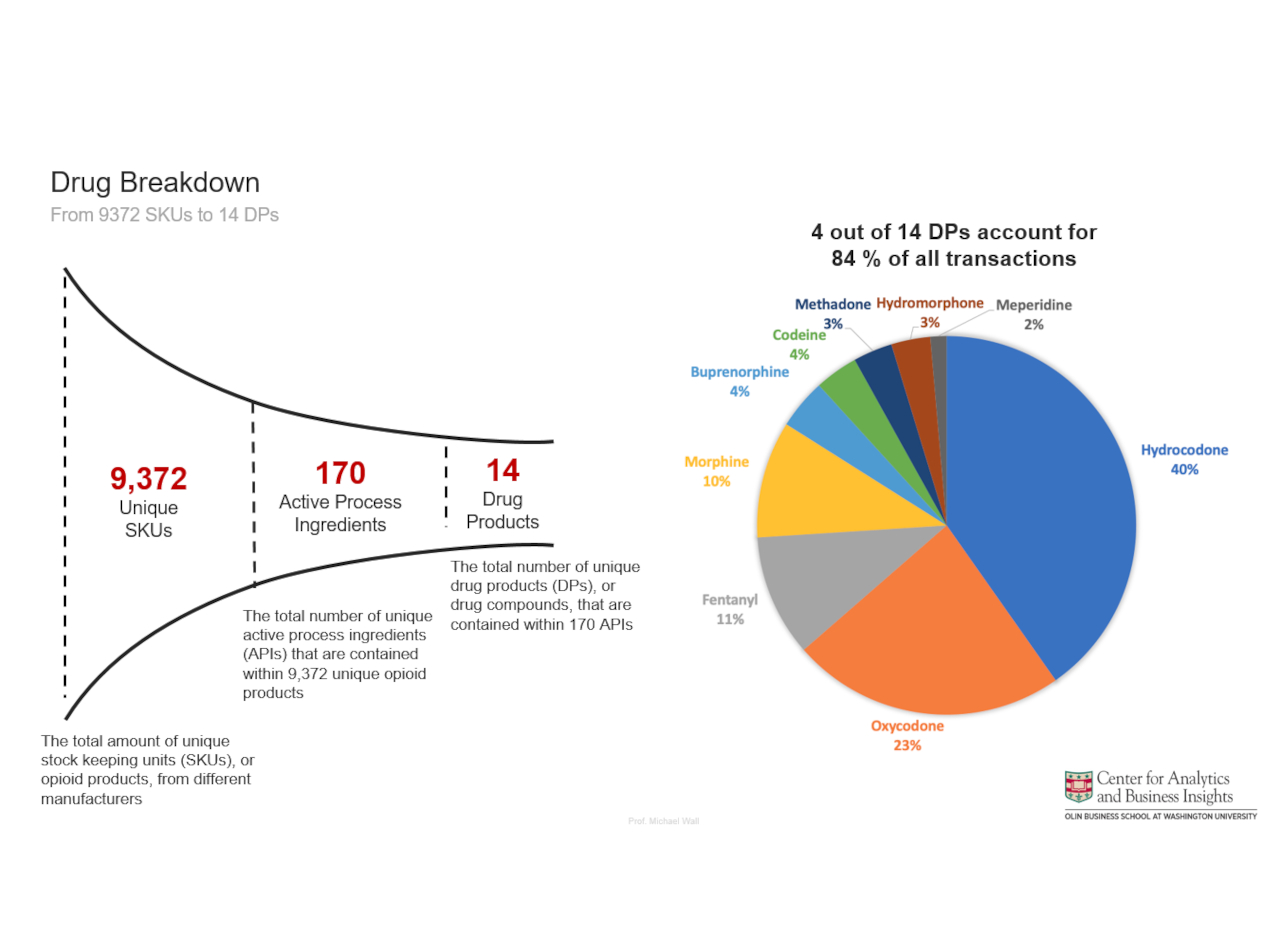Olin researchers using machine-learning to flag suspicious opioid sales
- August 16, 2021
- By Kurt Greenbaum
- 3 minute read

WashU Olin’s Center for Analytics and Business Insights is on the cusp of creating a machine-learning tool to flag suspicious opioid sales, just as government lawyers announced a multibillion-dollar settlement against three major drug distributors—a settlement that requires a database to track the destination of every opioid dose.
Analyzing a database of more than 400 million opioid transactions from the US Drug Enforcement Administration—a database that includes 277,000 buyers from 2006 to 2012—Olin researchers are building an algorithm that would help law enforcement officials identify shady opioid transactions in the future. The Olin scholars are working to understand key differences in the characteristics and behaviors of convicted buyers who they have identified in the data set to that of unconvicted buyers to inform their model-building approach.
“We want to ‘learn’ what variables distinguish the ‘bad’ buyers from the ‘good’ buyers,” said Seethu Seetharaman, Olin’s W. Patrick McGinnis Professor of Marketing and co-director of the Center for Analytics and Business Insights. “Once we learn the important variables that distinguish bad buyers from good buyers, we train a machine-learning algorithm to take these variables for a given buyer and give a probability score of that buyer being a bad buyer.”
Research to support policy recommendations
Seetharaman, along with CABI co-director Michael Wall, is collaborating with Luoyexin (Annie) Shi, an Olin PhD student in quantitative marketing, on the analysis. The research underpins the first of three projects by the Olin-Brookings Commission. This first project centers on the opioid crisis and what policy measures are needed to confront it long-term.
The entire initiative was made possible by a $750,000 grant from The Bellwether Foundation Inc. This first commission, like the next two, is charged with tackling topics affecting the quality of life for people in St. Louis and across the country.
Seetharaman said the team’s work on the DEA data has quickly shown promise as a law enforcement tool to flag transactions that divert often legitimate prescription therapies toward illicit uses.
“Using the predictive algorithm, the DEA could predict a buyer’s probability of being a bad buyer,” he said. “This way, the DEA can allocate their human and capital resources wisely among high-value leads.”
A well-timed approach
The results come just weeks after lawyers for states, cities and counties plagued by staggering numbers of opioid deaths announced a tentative $26 billion settlement against three distributors of pharmaceutical painkillers: McKesson, Cardinal Health and AmerisourceBergen. The settlement would also include Johnson & Johnson, which no longer supplies raw material for opioids or sells such painkillers in the United States.
“Under the deal, the three distributors, which control 85 to 90% of the market, are required to establish and fund a ‘clearinghouse’ that shows where every opioid dose is headed,” The Washington Post wrote in its report on the settlement. “They must check the database before sending out each shipment of pills and hold theirs back if it appears that the recipient is asking for an extraordinary amount of drugs, a typical sign that some are being diverted and sold on the street.”
According to The Post, more than 100 billion prescription hydrocodone and oxycodone pills were distributed in the United States from 2006 to 2014. Last year, approximately 69,700 people died of overdoses involving opioids in the United States.
Shi said the database she’s analyzing—known as ARCOS, or Automated Reports and Consolidated Ordering System—covers the sale of 14 main varieties of opioids. Those can be further broken down into 170 kinds of substances, and further broken down into 9,133 different products.
The inaugural Olin-Brookings Commission includes a dream team of data scientists, law enforcement authorities, medical professionals and addiction experts with years of industry and policy experience between them. Commission chair Anthony Sardella—founder of evolve24, Olin faculty member and CABI research advisor—serves as a critical conduit between research efforts and the expertise of the commission.
In their current project, supported by CABI, the group is charged with identifying strategies for combatting the epidemic of opioids and recommending any changes in local, state and federal policy that might help curb the problem and sharpen the response from experts.
The commission’s next meeting is set for August 19. The group intends to issues its final report and policy recommendations in early 2022.
Media inquiries
For assistance with media inquiries and to find faculty experts, please contact Washington University Marketing & Communications.
Monday–Friday, 8:30 to 5 p.m.
Sara Savat
Senior News Director, Business and Social Sciences
